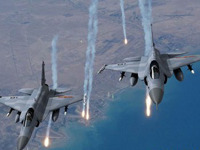Is there future for Russian arms exports?
 Is there a future for the Russian arms exports? Russia has the reasons to be concerned with this issue at this particular moment. Indeed, in the recent years sales of the Russian weapons abroad were associated mainly with the countries of the Maghreb and the Middle East due to the fact that the Chinese have abandoned their once large-scale purchases by copying everything they need.
Is there a future for the Russian arms exports? Russia has the reasons to be concerned with this issue at this particular moment. Indeed, in the recent years sales of the Russian weapons abroad were associated mainly with the countries of the Maghreb and the Middle East due to the fact that the Chinese have abandoned their once large-scale purchases by copying everything they need.

However, Russia has some issues in the Middle East sector as well. For example, last year Russia did not supply S-300 to Iran, which has jeopardized further development of the military trade relations with the country that has earlier promised multibillion-dollar profits. Now Russia has to deal with the consequences of a series of revolutions in the Arab world which has already led to serious changes in the geography of the Russian arms exports. Moscow has agreed to support the arms embargo against Libya beset by a civil war. As a result, the prospects for the implementation of Russia's previous agreements with Gaddafi are now questionable.
The situation is unstable in Algeria, one of the major buyers of Russian arms. It is not ruled out that the external forces will try to "rock the boat" in Syria, Russia's traditional partner in military-technical cooperation (MTC).
Is it possible in this situation to talk about long-term partnership with the previous buyers of Russian weapons? Experts Yevgeny Satanovsky, Alexander Khramchikhin and Konstantin Sivkov answered this question in an interview with Pravda.ru.
Yevgeny Satanovsky, president of the Middle East Institute: "We cannot speak of any kind of long-term contracts in this region. No one can vouch for the stability of the ruling regimes in the countries from the Atlantic to the Indian Ocean, even Saudi Arabia. Therefore, in view of the current events there can be very serious changes on the arms market. Now we can seriously talk about the development of MTC with the countries of the region in the short term. In other words, executed contracts are those with a prepayment".
Konstantin Sivkov, first vice-president of the Academy of Geopolitical Issues: "We have noticeably lost ground in the arms market in the region last year when, under pressure from the United States, we refused to fulfill a contract to supply S-300 missiles to Iran. We have shown to the entire world that the long-term cooperation in MTC is not possible and that we depend on the opinions of the Americans.
There is no need to entertain the thought that in spite of this we will retain the former influence in the countries that are independent of the U.S. policy. Some may think that countries like Iran and Libya have nowhere to go, and that sooner or later they will be buying Russian weapons again. This is not the case. Iran was not bluffing when, after the termination of the S-300 contract by Russia, it said that it has obtained similar equipment through other channels.
In fact, last year Russia left the arms market of that country. But as you know, a holy place is never empty, and China has already replaced Russia with its HQ-9 SAM, which are really an analog of S-300.
Obviously, the same will happen to Libya. For Gaddafi Russia's accession to the arms embargo means absolutely nothing. He has so many weapons that the supplies will last for many years. However, it is unlikely that he will forgive us this behavior".
Alexander Khramchikhin, deputy director of the Institute of Political and Military Analysis: "With regard to Libya, the prospects for further cooperation remain rather vague. Apparently, the decision for Russia to join the sanctions was taken on the grounds of gloomy prospects for Gaddafi. However, the earnest hope that the rebels that came to power will rush into our arms would not be too serious.
If we are talking about the arms market in the region in general, we may lose the benefits of failed transactions for modernization of the weapons that have been already supplied. In Soviet times, we have supplied thousands of armored vehicles, hundreds of planes, etc., to Arab countries. Today they have become obsolete, but their life could be prolonged through certain updates. This type of MTC it terms of profitability is not inferior to the supply of new weapons. In particular this applies to Algeria, Libya and Syria.
The latter, being almost 100 percent equipped with Soviet and Russian weapons, at first glance seems to be simple, but it is not. Even if we lose the Syrian market it will not be catastrophic because the Syrians cannot pay, even given the fact that they are largely financed by Iran and Saudi Arabia.
If, however, we analyze the situation as a whole, there are unrests in the region and it is not ruled out that in the near future the old regimes will change. In this case we can only state the fact of the existence of threats to our arms exports, but we cannot oppose anything to it.
Given that many of the countries in the region are unstable and that radicals may come to power, the prospects for further cooperation with them are becoming hazy. I am afraid that as a result both Russia and the West would lose. China will be the one to win. As obvious from its relations with Iran, they do not take into account the policy of doing business with odious regimes".
Sergei Balmasov
Pravda.Ru
Subscribe to Pravda.Ru Telegram channel, Facebook, RSS!


